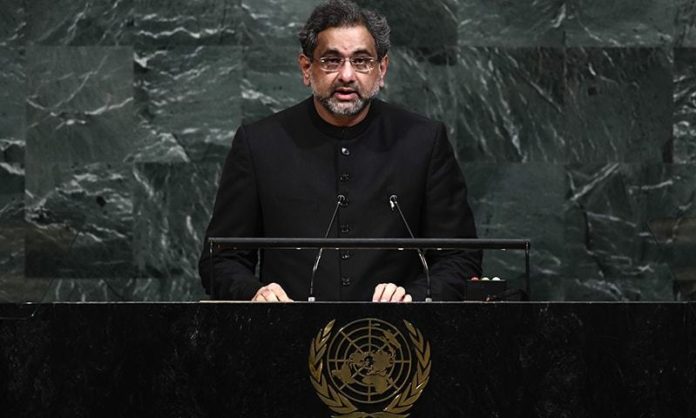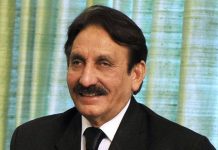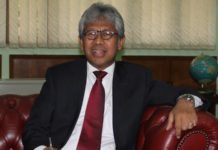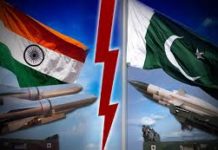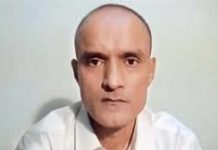Web Monitoring
Pakistan will not become a “scapegoat” for Afghanistan’s bloodshed or to fight wars for others, Prime Minister Shahid Khaqan Abbasi told the United Nations on Thursday.
Addressing the UN General Assembly, Abbasi did not explicitly criticise US President Donald Trump’s new strategy on Afghanistan and South Asia but made clear his displeasure with the renewed onus on Pakistan.
“Having suffered and sacrificed so much due to our role in the global counterterrorism campaign, it is especially galling for Pakistan to be blamed for the military or political stalemate in Afghanistan,” Abbasi said.
“We are not prepared to be anyone’s scapegoat,” he said.
“What Pakistan is not prepared to do is to fight the Afghan war on Pakistan’s soil. Nor can we endorse any failed strategy that will prolong and intensify the suffering of the people of Afghanistan and Pakistan and other regional countries,” he said.
Abbasi said that 27,000 Pakistanis have been killed by extremists since the launch of the US war on terror after the September 11, 2001 attacks.
He called for a priority on eliminating extremists, including from the militant Islamic State (IS) group and Al Qaeda, in Afghanistan but ultimately a political solution with the Taliban.
He said that Pakistan had fought the war against terror from its own resources with economic losses estimated at over US$120 billion.
“Yet, we remain committed to fully implementing our National Action Plan against terrorism and extremism,” he reiterated.
Prime Minister Abbasi reiterated in his speech that Taliban ‘safe havens’ are not located in Pakistan “but in the large tracts of territory controlled by the Taliban in Afghanistan”. He said cross-border attacks did occur, but those were mostly conducted by anti-Pakistan terrorists from the “safe havens” across the border.
“To end all cross-border attacks we ask the Afghan government and the Coalition to support and complement Pakistan’s ongoing efforts to strengthen border controls and monitor all movement across it.”
The prime minister said the people of two countries had suffered the most from four decades of foreign intervention and civil wars in Afghanistan, blighting Pakistan with the flow of extremists and terrorists, guns and drugs and millions of refugees.
“They have set back our economic development by decades. Even today, Pakistan is host to over 3 million Afghan refugees,” he said.
Prime Minister Abbasi said, “No one desires peace in Afghanistan more than Pakistan”. However, after 16 years of war in Afghanistan, it was clear that peace would not be restored by the continuing resort to military force.
“Neither Kabul and the Coalition, nor the Afghan Taliban, can impose a military solution on each other.”
He said Pakistan believed that the urgent goals in Afghanistan should include concerted action to eliminate the presence in Afghanistan of Daesh, Al Qaeda and their affiliates, including the Tehreek-i-Taliban Pakistan and Jamaat-ul-Ahrar, which was recently declared a terrorist organisation by the Security Council.
He suggested promotion of negotiations between Kabul and the Afghan Taliban — in the Quadrilateral Coordination Group (QCG) or any trilateral format — to evolve a peaceful settlement in Afghanistan.
Abbasi, who took office last month after his predecessor Nawaz Sharif was disqualified from office by the Supreme Court, used his UN address to renew Pakistan’s condemnation of India’s rule in held Kashmir.
Accusing India of using “massive and indiscriminate force” in held Kashmir, Abbasi urged an international investigation and warned of escalation on their military frontier, the Line of Control.
“Pakistan has acted with restraint. But if India does venture across the LoC, or acts upon its doctrine of limited war against Pakistan, it will evoke a strong and matching response,” he said.
He was referring to an Indian strategic doctrine, rarely discussed openly, of a limited military response on Pakistan that is intended to stop short of triggering a nuclear reprisal.
Human rights violations by India in India-held Kashmir clearly constitute war crimes and violate the Geneva Conventions, Abbasi said, adding that India refuses to implement the UN Security Council resolution on Kashmir that mandates a UN-supervised plebiscite for the people of Jammu and Kashmir “to freely decide their destiny”.
“India’s deployment of 700,000 troops in IHK to suppress Kashmiri movement is the most intense foreign military occupation in recent history,” he said, according to a tweet by Foreign Office spokesman Nafees Zakaria.
Abbasi said Pakistan urges the international community to call on India to halt pellet gun attacks on unarmed Kashmirs, stop “use of rape as instrument of state policy”, end media blackouts, rescind its “draconian emergency laws”, and free all Kashmiri political leaders.
“We ask that the United Nations Secretary-General and the High Commissioner for Human Rights send an inquiry Commission to occupied Kashmir.”
The prime minister said Pakistan, confronted by a “hostile and increasingly militarised neighbour”, had been obliged to maintain the capability for credible deterrence.
He said Pakistan had developed its nuclear weapons only when those were introduced in the region by its neighbour.
“Our strategic assets are vital to deter oft-threatened aggression. They are tightly and effectively controlled, as has been widely acknowledged by experts.”
He said the world community would be well served by enabling Pakistan to join global non-proliferation arrangements, such as the Nuclear Suppliers Group on a non- discriminatory basis.


